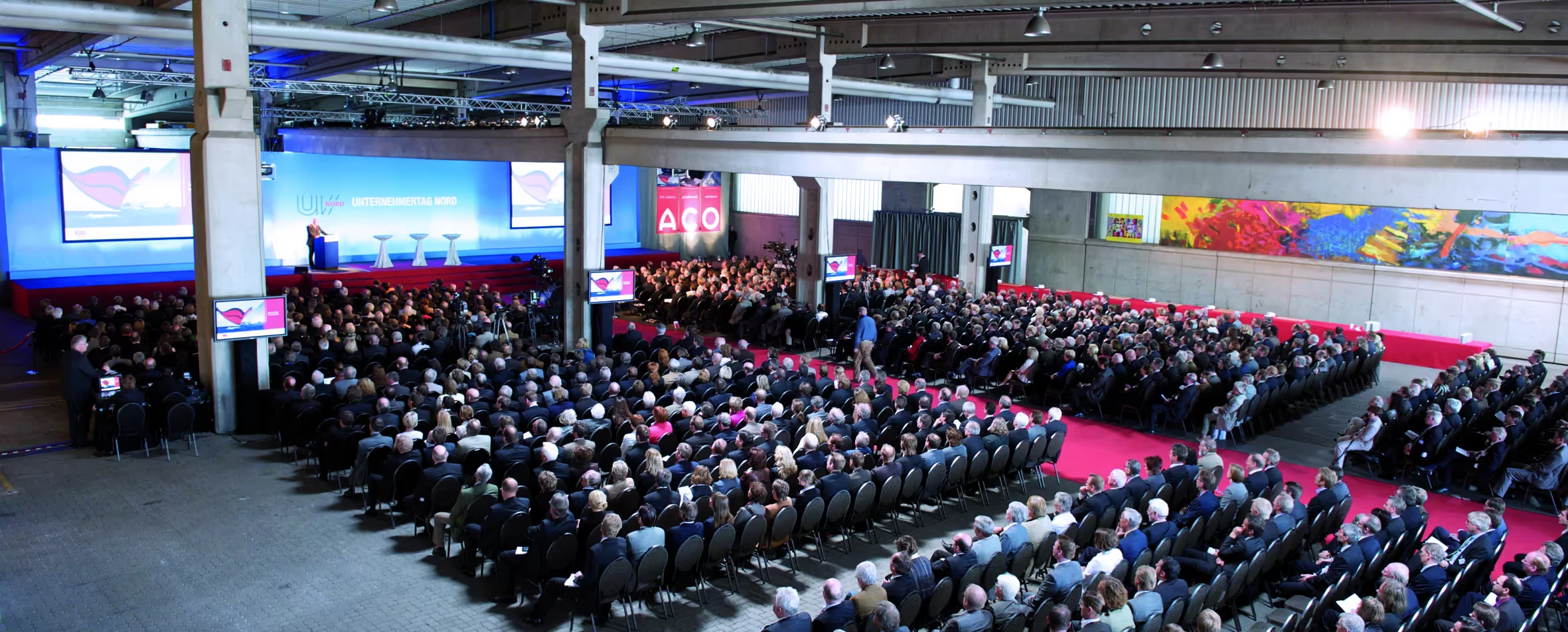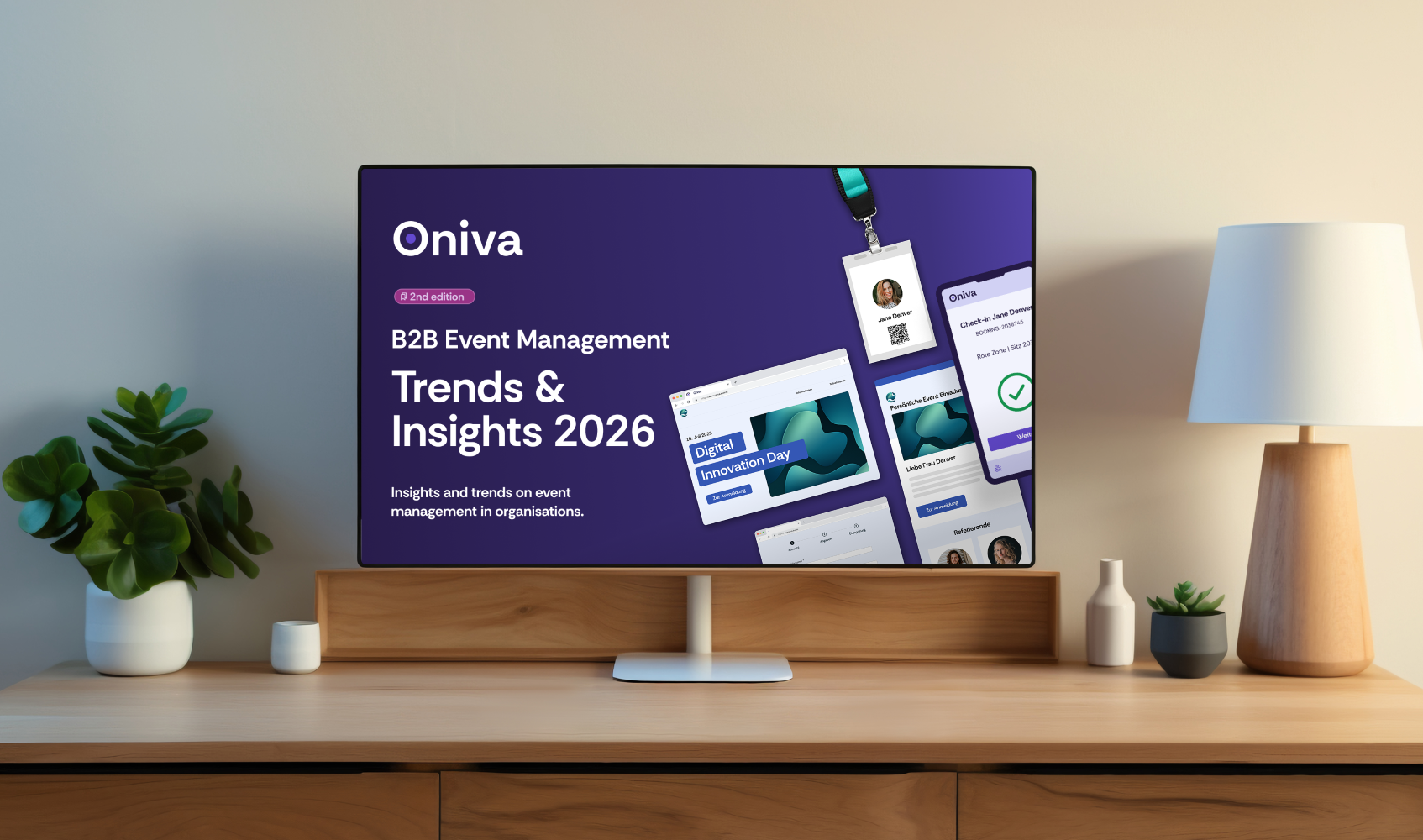1. No clearly defined goals and KPIs
A common mistake in event marketing is the lack of clearly defined goals and key performance indicators (KPIs). Without specific goals and measurable KPIs, it is difficult to evaluate the success of an event. Companies should set clear goals before planning begins, such as the number of expected attendees, lead generation, or increased brand awareness. KPIs help track progress and make adjustments when necessary.
Impact: Lack of control and no clear picture of whether the event met expectations. Resources are used inefficiently.
Tips to avoid this: Define measurable goals (e.g. number of leads, registrations, conversion rate). Use Oniva to track KPIs in real time and to generate measurable evaluations.
2. No continuous collection of event data
The consistent collection of event data using an event tool is essential for analysing the success of an event and improving future ones. Often, no data or only isolated figures such as the number of event registrations are recorded. However, both the open rate and, for example, the no-show rate are crucial to the success of your event. Only through a comprehensive collection of event data can you gain meaningful insights into your event’s success and build a solid foundation to improve your event marketing.
Impact: No meaningful basis for optimising event marketing.
Tips to avoid this: Use tools like Oniva to centrally collect event data and measure your event marketing, including GDPR-compliant analysis of your event.
3. Impersonal event communication
Participants value personalised communication. A generic, impersonal approach can make them feel unappreciated. Event organisers should use personalised invitations, tailored content, and targeted follow-up messages as part of guest management to build a stronger connection with participants and create a more individualised event experience.
Impact: Lower emotional engagement and reduced participation and registration rates.
Tips to avoid this: Use Oniva’s personalisation features for invitations, reminders, and follow-ups. Segment your target groups strategically.
4. Too many reminder emails
While reminder emails are important to keep participants informed about upcoming events, too many emails can be perceived as annoying and may lead to unsubscribes. It is crucial to find a balanced approach. A well-thought-out communication plan with timely reminders is essential.
Impact: Cancellations, negative brand perception, and ignored communications.
Tips to avoid this: Use Oniva to create automated event communication tailored to the relevant recipient group — for example, based on guest status.
5. Unattractive or irrelevant event programme
An event's success heavily depends on its programme. An unattractive or irrelevant programme can cause participants to lose interest or not attend at all. Event managers should thoroughly understand their target audience's interests and needs and create a varied, exciting programme that offers real value.
Impact: Low registration rate, lack of engagement during the event, negative feedback.
Tips to avoid this: Conduct surveys in advance to understand the interests of your target audience and tailor your event programme accordingly.
6. Poor data quality or insufficient analysis of the target audience
Insufficient target audience analysis and poor data quality can result in reaching the wrong people or failing to engage relevant audiences. A thorough analysis of the target audience and the use of high-quality data are crucial to attracting the right participants and making the event successful. Sending a large number of invitations indiscriminately does not lead to success and can have negative consequences.
Impact: Poor registration rate, risk of your email sender address being classified as spam.
Tips to avoid this: Use segmentation features, analyse and verify your data before sending out event communications.
7. Inconvenient event date or location
Choosing the right event date and location is another critical factor. An inconvenient date that conflicts with other important events or holidays can significantly reduce attendance. Likewise, a hard-to-reach or unattractive location can deter potential participants. Organisers should carefully research and select a date and venue that are ideal for their target audience.
Impact: Low registration rate, last-minute cancellations, damage to your reputation.
Tips to avoid this: Research public holidays and industry dates. Use Oniva’s analytics to identify preferred timeframes and choose central, easily accessible venues.
8. Insufficient event promotion
Even the best event can fail if it is not adequately promoted. A common mistake is neglecting a comprehensive marketing strategy. Effective event promotion should utilise various channels, including social media, email marketing, PR, and partnerships, to achieve broad reach and generate interest.
Impact: Low registrations, wasted budget, lost potential.
Tips to avoid this: Rely on a multichannel mix: email, social media, and Oniva’s event landing pages.
9. Lack of or inadequate event follow-up
After the event is over, proper follow-up is crucial. Failure to do so can lead to the loss of valuable insights and missed opportunities to build participant loyalty. Thorough follow-up, including analysing feedback and data from the registration tool and communicating with participants, is essential to improve experiences and optimise future events.
Impact: Lost leads, missed learning opportunities for future events.
Tips to avoid this: Use Oniva to send follow-up emails and feedback surveys, and track successes via the dashboard. Apply these insights to your next event planning.
10. No integrated process focused on the registration experience
The registration experience is often the first point of contact with the event and should therefore be seamless and user-friendly. A complicated or confusing registration process can deter potential participants. Organisers should rely on an integrated system that enables easy registration, clear communication, and prompt confirmation.
Impact: High drop-off rates, uncertainty, negative perception.
Tips to avoid this: Use Oniva for a consistent, mobile-optimised registration experience with clear steps, automatic confirmation, and straightforward communication.
Those who understand and deliberately avoid these common mistakes in event marketing create an unforgettable event experience with a lasting, positive effect. Oniva supports you as smart event management software throughout all stages – from planning and participant management to follow-up. This way, every event becomes a successful experience.



















.svg)















































































